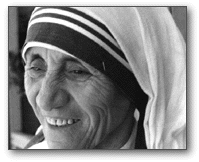 The Norwegian Nobel Committee has awarded the Nobel Peace Prize for 1979 to Mother Teresa.
The Norwegian Nobel Committee has awarded the Nobel Peace Prize for 1979 to Mother Teresa.Thirty years ago Mother Teresa left her teaching post at a Roman Catholic girls' school in Calcutta in order to devote her life to working among the poorest of the poor in the slums of that city. The Roman Catholic order of which she is now the head has in recent years extended its activities to include a number of other Indian cities and other parts of the world. In making the award the Norwegian Nobel Committee has expressed its recognition of Mother Teresa's work in bringing help to suffering humanity. This year the world has turned its attention to the plight of children and refugees, and these are precisely the categories for whom Mother Teresa has for many years worked so selflessly. The Committee has placed special emphasis on the spirit that has inspired her activities and which is the tangible expression of her personal attitude and human qualities. A feature of her work has been respect for the individual human being, for his or her dignity and innate value. The loneliest, the most wretched and the dying have, at her hands, received compassion without condescension, based on reverence for man. In Mother Teresa's case, this basic philosophy of life is firmly rooted in her Christian faith. In Calcutta and elsewhere, she has enlisted the help of assistants from other religious denominations. She has also been recognised by the Indian authorities and by the Asian Secretary-General of the United Nations, the Buddhist U Thant. This is not the first time the Norwegian Nobel Committee has awarded the Peace Prize for work undertaken in the struggle to overcome poverty and distress in the world, which also constitute a threat to peace. It has awarded the Peace Prize to champions of human rights, including those who have fought for racial equality. In the eyes of the Norwegian Nobel Committee, constructive efforts to do away with hunger and poverty, and to ensure for mankind safer and better world community in which to develop, should be inspired by the spirit of Mother Teresa, by respect for the worth and dignity of the individual human being.
|
|
BOES.ORG International Campaign to Ban Landmines (ICBL) ICBL NGO-links www.nobel.no Related BBC-links Celebrations in Calcutta 19 October, 2003, 11:33 GMT In pictures: Mother Teresa beatified 19 October, 2003, 11:02 GMT Pope beatifies Mother Teresa 19 October, 2003, 09:55 GMT Pilgrims' joy at Teresa ceremony 19 October, 2003, 09:03 GMT |
Laureates 2004: Wangari Maathai. For her contribution to sustainable development, democracy and peace. She thinks globally and acts locally. 2003: Shirin Ebadi, Iran, 1947-. Lawyer and human rights activist, for her efforts for democracy and human rights. She has focused especially on the struggle for the rights of women and children. 2002: Jimmy Carter, USA, 1924-. For his decades of untiring effort to find peaceful solutions to international conflicts. 2001: The prize was divided equally between: The United Nations ( U.N.) and its Secretary-General, Kofi Annan, Ghana, 1938- For their work for a better organized and more peaceful world. 2000: Kim Dae Jung, Republic of Korea, 1925-. For his work for democracy and human rights in South Korea and in East Asia in general, and for peace and reconciliation with North Korea in particular. 1999: Doctors Without Borders (Médecins Sans Frontières) In recognition of the organisation's pioneering humanitarian work on several continents. 1998: The prize was divided equally between: John Hume, Northern Ireland, 1937-; and David Trimble, Northern Ireland, 1944-. For their efforts to find a peaceful solution to the conflict in Northern Ireland. 1997: The prize was divided equally between: International Campaign to Ban Landmines (ICBL) and Jody Williams, USA, 1950-. 1979: Mother Teresa, India, 1914-1997. Leader of the Order of the Missionaries of Charity. |
|
|